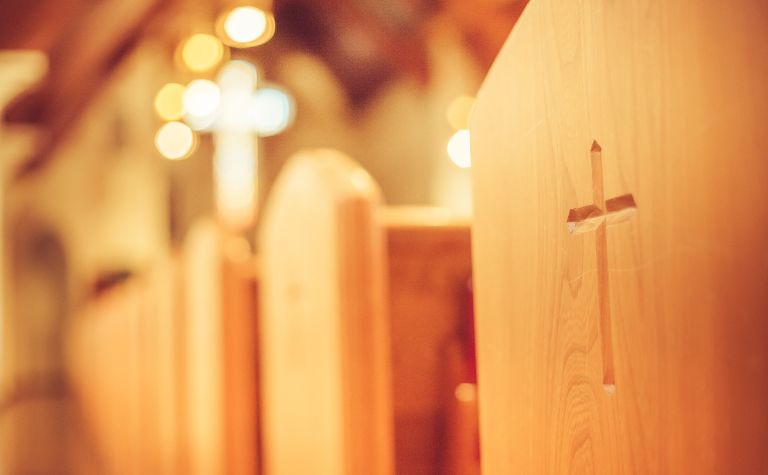Pentecostalism has been a growing and influential branch of Protestant Christianity for over a century. Though Pentecostals agree on the core doctrines of the Christian faith, such as the Trinity, there are differences in sanctification, which refers to the process of a believer maturing in their faith and growing in Christlikeness.
Historic Pentecostalism believes Christians grow in holiness in this life but will not reach a state of sinless perfection until heaven. Holiness Pentecostalism teaches that Christians can grow in Christlikeness to the extent that they no longer sin in this lifetime.
What is the largest historic Pentecostal denomination? What are the largest Holiness-Pentecostal denominations? What Bible verses do Holiness-Pentecostal churches emphasize? Do Historic and Holiness-Pentecostal Christians both speak in tongues? Keep reading to learn the answers to these questions and others.
Also, see Pentecostal vs. Apostolic: What’s the Difference? to learn more.

Historic and Holiness Pentecostalism Compared
| Historic Pentecostalism | Holiness Pentecostalism | |
|---|---|---|
| Founded | Historians conventionally date the origin of the modern Pentecostal movement to the Azusa Street Revival in Los Angeles, California, in 1906. Many Pentecostals date their origin to the second chapter of Acts in the New Testament. | Holiness Pentecostalism was born out of the Holiness Movement in the Methodist tradition, which is conventionally dated to the 19th century. |
| Meaning of the name | The word “Pentecostal” comes from the word “Pentecost,” which describes the unique and powerful outpouring of the Holy Spirit upon the early church, as recorded in Acts 2. | “Holiness” refers to the doctrine that is closely associated with sanctification. The tradition is also known as “Wesleyan Pentecostals” or “Methodist Pentecostals.” |
| Founder | Pentecostalism doesn’t have a single founder. All of the early influencers (see below) contributed to the establishment of the modern movement. | John Wesley (1703-1791) is the traditional founder of the Holiness tradition, according to followers. Certain leaders of the Second Great Awakening, like Phoebe Palmer, were also influential. |
| Branch of Christianity | Pentecostalism is Protestant. Many of the ideas it embraces are rooted in the Protestant Reformation, led by Martin Luther of Germany, Ulrich Zwingli of Switzerland, and John Calvin of France. | Holiness Pentecostalism is Protestant and affirms the core tenants of the Reformation. |
| Early influencer(s) | William J. Seymour (1870-1922), Agnes Ozman (1870-1937), Charles Parham (1873-1939) | Other than Wesley and Palmer, the tradition credits those who influenced the Asuza Street Revival, like Seymour, Ozman, and Parham. |
| Significant writing outside the Bible | Pentecostalism doesn’t have any literature that is unique to its tradition that is of great significance to the establishment and identity of the movement. It generally values the classic literary works of Protestantism. | “The Holiness Manifesto” (2006); “The Book of Discipline of the Global Methodist Church” |
| Organization | Historically, Pentecostalism isn’t a denomination per se but a belief system that certain denominations hold. The largest historic, non-holiness Pentecostal denomination is the Assemblies of God. | Holiness Pentecostalism is a set of beliefs that certain denominations, churches, and Christians affirm and defend. The term doesn’t describe a denomination per se.* |
| Divisions | Disagreements between Pentecostals often include the doctrine of perfectionism. | People and churches in Holiness Pentecostalism don’t always agree about the benefit of revivals, how closely to follow Wesley on all matters of doctrine, worship styles related to music, and how much engagement believers should have with secular society. |
| Theological and Social worldview | Pentecostal denominations and churches tend to be conservative theologically and in relation to social issues. | In general, Holiness Pentecostal Christians are conservative on theological and social issues. |
*How many Holiness denominations and churches are there? In the Holiness-Pentecostal tradition, there are dozens of associations (e.g., missions agencies like One Mission Society) and denominations, thousands of churches, and millions of Christians. Denominations within the movement, including,
- Church of God (Anderson, Indiana)
- The Church of the Nazarene
- Free Methodist Church
- The Salvation Army
- The Wesleyan Church
Dozens of colleges and universities affirm Holiness doctrine, including,
- Anderson University (Indiana)
- Asbury University
- Azusa Pacific University
- Indiana Wesleyan University
- Northwest Nazarene University
Also, see Pentecostal vs. Church of God: What’s the Difference? to learn more.

Pentecostal Christian Traditions: Beliefs and Practices
Holiness Pentecostalism emphasizes two verses from the New Testament book of 1 John. Although other Scriptures inform their convictions about sanctification, these two verses provide the foundation of their beliefs. What followers stress in the verses are the references to not sinning.
- 1 John 3:9, “No one who is born of God will continue to sin, because God’s seed remains in them; they cannot go on sinning, because they have been born of God.” (NIV)
- 1 John 5:18, “We know that anyone born of God does not continue to sin; the One who was born of God keeps them safe, and the evil one cannot harm them.”
What role does love play in sanctification? Notably, the doctrine of perfectionism (also called “entire sanctification”) is defined by sinlessness, but according to its followers, it’s driven by a person’s love for God.
Perfection isn’t attained simply through “willpower” or good works but through a person’s love for God and others replacing their love for the world. (Also see Pentecostal vs. Charismatic: What’s the Difference?)
| BELIEFS | Historic Pentecostalism | Holiness Pentecostalism |
|---|---|---|
| Theology | Historic Pentecostals are Protestant Christians. They believe that the Bible is authoritative for belief and practice and that sinners are saved by grace through faith and in Christ alone. | Holiness Pentecostals are also Protestant and affirm the authority of Scripture and salvation by grace through faith in Christ alone. |
| God | Historic Pentecostals are devout Trinitarians. They believe there is one God and that the Father, Son (Jesus Christ), and Holy Spirit are each fully God. | Holiness Pentecostals are also Trinitarian. |
| The Bible | Historic Pentecostals believe God inspired the biblical authors. Many conservatives use the term “inerrancy” to describe the nature of the text. | Holiness Pentecostals believe God inspired the authors of Scripture, which makes it authoritative for articulating doctrine and establishing directives and boundaries for Christian living. |
| Christ and atonement | Historic Pentecostals believe that Jesus is the second person of the Trinity; they hold to “penal-substitutionary atonement,” which means Jesus’ death paid the price for sin, and on the cross, he took the place of sinners. | Holiness Pentecostals affirm the penal-substitutionary atonement of Christ, which alone enables the forgiveness and redemption of sinners apart from good works. |
| Salvation | Historic Pentecostals are mostly Arminian, although there are some Calvinist or Reformed Christians who believe in the miraculous gifts of the Spirit. | Holiness Pentecostals are Arminian in the Wesleyan theological tradition. Sanctification, including perfectionism, occurs after conversion and is not a condition for it. |
| Sanctification | Some Pentecostals reject the doctrine of perfectionism; others affirm it. | Holiness Pentecostals affirm the doctrine of perfectionism. |
| Spiritual gifts | Historic Pentecostals believe that all the spiritual gifts mentioned in the New Testament are operational and available for Christians today. This includes speaking in tongues, divine healing, and other miraculous gifts. | Holiness Pentecostals have the same convictions as other Pentecostals regarding baptism in the Holy Spirit, speaking in tongues, and miraculous gifts. |
| Water Baptism | Historic Pentecostals practice “Believer’s Baptism” as opposed to infant baptism. Baptism isn’t necessary for salvation. | Like other Pentecostals, Holiness Pentecostals practice Believer’s Baptism. |
| Communion | Historic Pentecostals believe the bread and the cup are memorials of Christ’s death. They don’t believe Christ is present in the elements in any way. | Like other Pentecostals, Holiness Pentecostals believe the bread and cup are memorials. |
| Eschatology | Historic Pentecostalism is premillennial, meaning it interprets the 1,000-year period described in Revelation 20:1-6 literally. The millennium occurs after the rapture, the seven-year tribulation, and the Second Coming. | Like other Pentecostals, Holiness Pentecostals are premillennial. |

Also see Do Pentecostals Celebrate Christmas? to learn more.
References:
[1] Source
[2] Source
[3] Source
Related Questions
Many people know that the terms "Pentecostal" and "evangelical" are associated with Christianity, but they aren't sure exactly how or what the difference is between them. The words may refer to a set...
The Pentecostal and Baptist traditions are two of the most prominent branches of Protestant Christianity. They have many beliefs and practices in common and have more similarities than differences....
